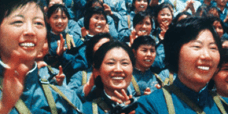Shanghainese welcome bid to revive dialect
When the first television news programme in Shanghainese launched late last month, many Shanghai residents welcomed the broadcast as an overdue jolt of support for a dying dialect.
But linguists and cultural experts say the 20-minute programme, Xin Wen Fang (News Workshop), which airs every Saturday evening, must be accompanied by a broader campaign to revive the dialect.
Cheng Naishan, a writer specialising in Shanghai's history and culture, said she hoped Xin Wen Fang becomes a daily broadcast. 'I hope there are more TV programmes in the Shanghai dialect,' she said. 'Dialect is the carrier of culture. Without dialect, local culture will also disappear.'
For the past two decades, many Shanghai residents have eschewed the dialect as almost no one outside the metropolis understands it. Even fluency in Putonghua is of little help because Shanghainese uses such different tones and vocabulary.
A study by the city's Academy of Social Sciences last month looked at the language habits of 21 primary school classes and 24 junior middle-school classes. It found only 60 per cent of pupils able to speak Shanghainese, the Shanghai Morning Post reports.
Qian Nairong, a professor of linguistics at Shanghai University, said the true picture was gloomier. His own observations of urban primary schools showed that one to two pupils out of an average class of 30 were fluent in the dialect.
'Those born between 1990 and 2000 can understand the Shanghai dialect, but they avoid using it in their regular communication,' Qian said.
'Most of those born after 2000 are unable to speak a single word of it.
'Without campaigns to promote the language, it will inevitably become extinct.'
Xia Hui, a Shanghai native, said she was distressed about her 12-year-old daughter's poor command of Shanghainese. 'My husband, her grandparents and I all speak the dialect at home. My daughter has no problems understanding what we are saying, but she always responds in Putonghua, except the occasional burst of simple words in Shanghainese,' Xia said.
Putonghua is the prevalent language at the girl's school, both in and out of the classroom. It's what her friends speak, including those from families born and raised in the city.
Shanghainese traces its roots to a language adopted by farmers in the current Songjiang district. It began to evolve dramatically in the middle of the 19th century, when the region was flooded by mainland migrants and foreign businessmen, said Qian.
Compared with the mainland's standardised Putonghua, the dialect has several tones that have been preserved in their older form. It is further distinguished by its adoption of many words transliterated from foreign languages.
Qian traces the slow disappearance of Shanghainese to a national campaign launched in 1992 to popularise Putonghua. 'At the outset, city leaders didn't favour diversified culture and they believed that only one language could thrive,' he said. 'Their method was to promote Putonghua and to suppress Shanghainese.'
Ding Dimeng , a scholar from Shanghai University, told huyu021.com, a website that promotes native Shanghai culture, that at the height of the campaign, teachers and students were forbidden from uttering a single Shanghainese words. Offenders would see their schools lose awards.
Qian said the number of teachers with knowledge of the dialect was dwindling, as many came from outside Shanghai.
Xia is among the few Shanghainese parents who insist her children speak Shanghainese, but she admits it's a struggle and often disheartening. 'During the winter and summer vacations, I tell my daughter to speak the dialect at home. If she wants something from me, she should ask in Shanghainese or I won't respond,' she said. 'It becomes so hard to do that because my daughter speaks the words slowly, and fails to finish a long or complicated sentence.'
Shanghai University's Qian attributes part of the dialect's decline to the lack of television and radio broadcasts using it. For a long time, the only programmes in Shanghainese were comic series and a show called Lao Niang Jiu ('Uncle'), which focuses on trivial family disputes, produced by Shanghai-based Dragon Television. 'Both comic series and Lao Niang Jiu are of no interest to children,' Qian said.
The backers of Xin Wen Fang told the Oriental Morning Post it took more than a month to find a hostess who could speak the dialect. Following the launch of the news programme, experts and volunteers are calling for additional initiatives to rekindle public interest in the dialect.
For his part, Qian has compiled a brochure on simple Shanghainese phrases, which will be distributed to students in September.
Wan Guohua, a Zhejiang native who is a lawyer in Shanghai, is satisfied with his fluent command of the dialect after three months of intensive study.
'I work in Shanghai and have established my family here,' said Wan, in his 30s, 'By learning the Shanghai dialect, I hope to strengthen my understanding of local culture.'
Wan believes his grasp of Shanghainese eases communication with native residents. 'But I should say in such an environment where the dialect is in a vulnerable position, learning it isn't an easy task and requires passion and persistence.'
Hong Kong opposition activist Joshua Wong put in solitary confinement with lights on 24 hours a day, after X-ray reveals ‘a shadow’ in his stomach
- Wong put in single cell in medical ward and source says he is to be there for several days
- The 24-year-old was remanded in custody in Lai Chi Kok Reception Centre on Monday
Joshua Wong arrives at the Lai Chi Kok Reception Centre on Monday. Photo: Winson Wong





















